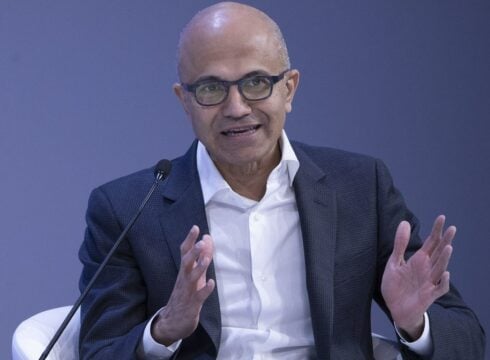SUMMARY
If a startup creates a new grid effectively for batteries, it will be relevant everywhere, said Nadella
According to the Microsoft CEO, regulation of technology is important, but over-regulation can increase costs
Microsoft is working with dozens of startups in India under various programmes
Inc42 Daily Brief
Stay Ahead With Daily News & Analysis on India’s Tech & Startup Economy
From Citizenship Amendment Act to data privacy, Microsoft CEO Satya Nadella has been vocal about his thoughts on India’s policies. He has also often reiterated his belief in India’s technological advancements. “When I come to India, I make sure we’re talking about our technology,” Nadella, who is on a three-day tour to India, said.
“There is nothing wrong with the consumer economy getting lots of innovation. After all, the mobile revolution along with consumer internet companies have really changed the lives of people, in terms of their access to services. The question now is, can we make it broader?”
According to Nadella, innovative ideas coming from India can have global reference. He said that if a startup creates a new grid effectively for batteries or builds an exoskeleton device for anybody with spinal cord injuries, those are the startups that will be relevant everywhere.
In an interview with ET, he spoke about the importance of building technologies in areas such as health, agriculture and education along with consumer tech and the role of Indian startups.
The Microsoft CEO also favours technology regulation but with caution. “It is important for technology to be regulated as it becomes increasingly critical, although over-regulation could increase costs to businesses, especially entrepreneurs,” he said.
According to him, as technology becomes much more pervasive, there will be regulation for things that are very mission-critical in our lives and society, just like regulation in food safety or the Federal Aviation Authority for air traffic (in the United States) and so on. “In 2030, the world will have over 50 Bn connected devices and India will be at the epicentre of innovation and product development capabilities,” he said while addressing the Microsoft Future Decoded Summit in Bengaluru on February 25.
Nadella also spoke about the pros and cons of Artificial Intelligence (AI) last month at the World Economic Forum (WEF) Annual Summit 2020, while quoting the example of New Delhi police using facial recognition to identify thousands of missing children in four days. “The best way to ensure there’s no bias in AI is to have the team creating the AI representing the diversity we want it to have,” he had said earlier.
Calling Privacy a human right again, he said, “We implemented the EU’s General Data Protection Regulation, but (also) took the subject rights and implemented them all over the world. In India, there will be equivalent legislation and we will conform to it.”
However, he also said that overregulating anything leads to increased transaction costs. “Even around AI and AI ethics, it’s ultimately a tool. How the tool gets used is something every country and society will need some norms around…one issue with overregulating anything means you fragment things, you increase transaction costs. The last thing you want to do is increase the cost of doing business for successful entrepreneurs from here,” he said.
Note: We at Inc42 take our ethics very seriously. More information about it can be found here.


